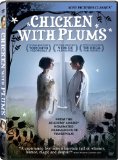| Reviews & Columns |
|
Reviews DVD TV on DVD Blu-ray 4K UHD International DVDs In Theaters Reviews by Studio Video Games Features Collector Series DVDs Easter Egg Database Interviews DVD Talk Radio Feature Articles Columns Anime Talk DVD Savant Horror DVDs The M.O.D. Squad Art House HD Talk Silent DVD
|
DVD Talk Forum |
|
|
| Resources |
|
DVD Price Search Customer Service #'s RCE Info Links |
|
Columns
|
|
|
Chicken with Plums
Sony Pictures // PG-13 // February 26, 2013
List Price: $30.99 [Buy now and save at Amazon]
The Film:
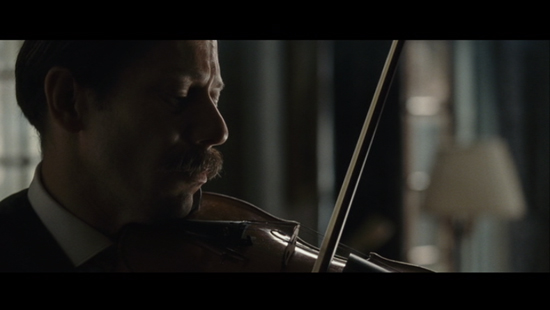
Graphic novelist Marjane Satrapi conjured quite a surprise when she adapted her Persepolis books to the big screen, infusing humor with a firm thematic current as she tells her story of life amid the Iranian Revolution through inky-black animation. Again, she pairs with artist and director Vincent Paronnaud to bring another of her books to life: Chicken With Plums (Poulet aux prunes), a live-action tale of a violinist whose will to live has reach a final barline. This isn't as directly personal of a story as Satrapi's first film, lacking the autobiographical notes and persistent hand-drawn artistry; however, melancholy expressions of faded passion replace those missing notes, casting a wider contemplative net about existence in a different sort of fable. It's not as triumphant as Persepolis, scattered in purpose and lacking the soul to embolden its melancholy reflections on death, but it still possesses a moving perspective on the subject that enriches its visual inventiveness.
Musician Nasser-Ali Khan (Mathieu Almaric) has arrived at an impasse: the lifeblood of his musical inspiration, his beloved violin, has been irreparably damaged. He'd like nothing more than to tuck a new instrument under his chin and continue doing what he loves -- which hasn't earned him any income in a long while -- but repeated attempts to play other violins have ended in disappointment and despair, with Nasser-Ali's wide-eyed expression growing more bereft with each attempt. Instead of settling for less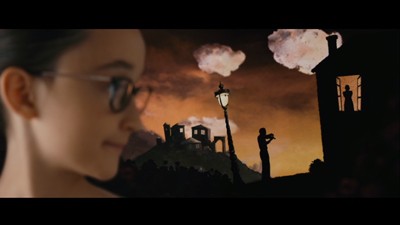 and embracing the new, he resigns himself to death; suicide doesn't inspire the respectable side of him, so he decides to simply wither away in a room next door to his frustrated wife, Faringuisse (Maria de Medeiros), and children. During that time, a span of eight days, he undergoes several stages of reflection as his life's experiences play before him, namely the woman whom he once loved, Irâne (Golshifteh Farahani).
and embracing the new, he resigns himself to death; suicide doesn't inspire the respectable side of him, so he decides to simply wither away in a room next door to his frustrated wife, Faringuisse (Maria de Medeiros), and children. During that time, a span of eight days, he undergoes several stages of reflection as his life's experiences play before him, namely the woman whom he once loved, Irâne (Golshifteh Farahani).
The majority of Chicken With Plums occurs either within the space of Nassar-Ali's mind or just outside the walls of his room in the rustic late-50s Tehran atmosphere, where sumptuously-lit photography follows the violinist as he hunts for a new violin and, after, contemplates how his life shall end. Satrapi and Paronnaud envelop his story in playfulness at first, rendering a tone not unlike a fusion of Jean-Pierre Jeunet's work and taste of surrealism a la Fellini. Scenes involving an antique store's dealer and a family dinner reveal a quirky cadence to the dialogue not unlike Delicatessen's or Amelie's, juxtaposed uniquely against images of Nasser-Ali disappearing between a pair of larger-than-life breasts and a satirical take on American TV sitcoms. The co-directors create lyrical fantasy with the violinist's glum contemplations, cleverly weaving his memories -- of childhood, of his past romance, of his forced relationship with Faringuisse -- into an inviting emotional tapestry that possesses some of the soul-searching that bolstered their previous creation.
Satrapi's writing evokes an ample gradient of emotion, which the cast of Chicken With Plums render into lucid, charismatic entities navigating a melancholy basis. Mathieu Almaric has shown comfort in the mental space of an edgy man losing his composure, and it eloquently fills the vessel of the wide-eyed violinist; he fluctuates between Nasser-Ali's vibrant younger years and the weatherworn afterthoughts later on, and he convincingly morphs them into an authentically downhearted bard of meager means. Moments where he handles violins -- such as the defeatist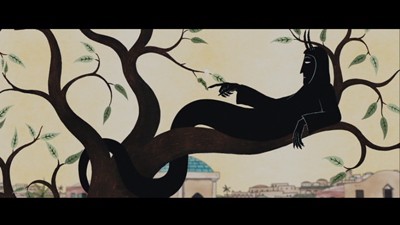 sensation when he "feels" what a new instrument does for him -- are the most potent, revealing the slivers of free emotion that this man of music occasionally allows himself to express. The slight, frustrated appearance of his unloved wife enhances Nasser-Ali's obsession and focus on the past, subtly achieved in the dutiful presence that Maria de Medeiros creates, and the disarming temperament of his long-lost love, Irâne, reveals why in whimsical flashbacks.
sensation when he "feels" what a new instrument does for him -- are the most potent, revealing the slivers of free emotion that this man of music occasionally allows himself to express. The slight, frustrated appearance of his unloved wife enhances Nasser-Ali's obsession and focus on the past, subtly achieved in the dutiful presence that Maria de Medeiros creates, and the disarming temperament of his long-lost love, Irâne, reveals why in whimsical flashbacks.
It's hard not to feel at arm's length from Chicken With Plums, though, partly due to the inherent design of Marjane Satrapi's story. Gradually, it takes shape into a metaphorical elegy of sorts, where the focus on Nasser-Ali's broken violin becomes a figurative expression of his passion and the futility of replacements. As the days of his life approach an end, underscored by a mythical conversation with the angel of death himself, Satrapi's narrative almost deliberately creates a conflicted sensation over the compassion felt for this man -- a man with a wife and children whom cannot divorce himself from the remnants of passion that crumbled upon his violin's destruction. The co-directors ensure that each expressive scene fits seamlessly with their melancholy purposes, and it's a beautifully-composed articulation of layered poetic intentions, yet that disconnect from the man with shattered enthusiasm renders an absorbing character exploration that, much like Nasser-Ali, can't quite resolve its emotional center.
The DVD:
Video and Audio:
It's a shame that Chicken With Plums didn't receive a Blu-ray release, because Vincent Paronnaud and Marjane Satrapi's a gorgeously-shot film is full of fun, inviting imagery, sumptuous lighting, and a few bursts of captivating graphical artistry. As with their previous DVD-only releases, Sony have ensured that the absence of a high-definition release isn't felt too intensely: this 2.35:1-framed, 16x9-enhanced transfer grasps the richness of the photography with a keen, nuanced eye. The subtle details in clothing, flutters of smoke, clock gears and Nasser-Ali's wood-grain violin(s) skillfully represent the textural flourishes of their artistic aims, while the depth of skin tones and the overall grasp on contrast furthers that grasp on mood. Aside from slight flatness and harshness due to the format's limitations, and an occasionally intense moment of moiring in some complex textures, it's a fine treatment.
The 5-channel Dolby Digital audio treatment covers roughly the same basis, a clear and mostly successful embodiment of musical touches and rustic environment representation. This isn't an aggressive audio experience, though, instead largely dialogue-driven and front-heavy with the aural pleasures it offers: the strum of a bow across a violin, the shattering of glass, and the chiming of a cuckoo clock. Instead, outside of a few robust crescendos in the music, the burden falls on the French language dialogue to sustain the audience's attention, which it mostly achieves; Almaric's crystal-clear voice hits a fine balance between high- and lower-end elements, while the voice of Azrael touches a bit on the bass quadrant -- but not aggressively so. A few moments of elevated voices create a raspy quality that showcases the track's limitations, and some of the balance only creates suitable ambience, but it'll do nicely. Subtitles are presented in bright, articulate English text.
Special Features:
An Audio Commentary with Marjane Satrapi and Vincent Paronnaud sheds some light on the decisions made for the film's casting and artistic directions, from the reason they chose (and contacted) Mathieu Almaric to how they seamlessly incorporated animation into the film through a pop-up book -- and, humorously, the connection between plums and Sophia Loren in Iran. Satrapi takes the wheel as the English-speaking portion of the track, while Vincent Paronnaud voices his parallel observations in French (not subtitled, unfortunately, even though Satrapi's are). Their insights are carried over into the Tribeca Q&A (15:07, 16x9), which, surprisingly, doesn't just simply retread the same content found in the commentary: they discuss character origins, more in-depth reasoning behind their decision against full-blown animation, and who assumes what directorial duties.
Sony have also included a fine, accurate Theatrical Trailer (1:54, 16x9) to round out these features.
Final Thoughts:
There's little not to like about Chicken With Plums, the follow-up to Persepolis from Marjane Satrapi and Vincent Paronnaud. Gorgeous, lyrical live-action imagery conducts a delightful yet melancholy exploration of losing inspiration and empty relationships, a fantasy centered on a man who resigns himself to death after the heart and soul of his musical ability, his violin, is destroyed. Bursts of surreal images and fanciful recollections to the past emphasize its more vibrant intentions, while strong performances from Mathieu Almaric and Maria de Medeiros give it an emotional edge. The content itself ends up being fascinating to behold but emotionally distanced, due to the story's nature, such as one can expect from a man whose ambition and longing for past experiences negate those joys he can have in the present. That's part of this visual limerick's ambition, though, which comes very strongly Recommended in this DVD package from Sony Pictures Classics.
Thomas Spurlin, Staff Reviewer -- DVDTalk Reviews | Personal Blog/Site

Graphic novelist Marjane Satrapi conjured quite a surprise when she adapted her Persepolis books to the big screen, infusing humor with a firm thematic current as she tells her story of life amid the Iranian Revolution through inky-black animation. Again, she pairs with artist and director Vincent Paronnaud to bring another of her books to life: Chicken With Plums (Poulet aux prunes), a live-action tale of a violinist whose will to live has reach a final barline. This isn't as directly personal of a story as Satrapi's first film, lacking the autobiographical notes and persistent hand-drawn artistry; however, melancholy expressions of faded passion replace those missing notes, casting a wider contemplative net about existence in a different sort of fable. It's not as triumphant as Persepolis, scattered in purpose and lacking the soul to embolden its melancholy reflections on death, but it still possesses a moving perspective on the subject that enriches its visual inventiveness.
Musician Nasser-Ali Khan (Mathieu Almaric) has arrived at an impasse: the lifeblood of his musical inspiration, his beloved violin, has been irreparably damaged. He'd like nothing more than to tuck a new instrument under his chin and continue doing what he loves -- which hasn't earned him any income in a long while -- but repeated attempts to play other violins have ended in disappointment and despair, with Nasser-Ali's wide-eyed expression growing more bereft with each attempt. Instead of settling for less
 and embracing the new, he resigns himself to death; suicide doesn't inspire the respectable side of him, so he decides to simply wither away in a room next door to his frustrated wife, Faringuisse (Maria de Medeiros), and children. During that time, a span of eight days, he undergoes several stages of reflection as his life's experiences play before him, namely the woman whom he once loved, Irâne (Golshifteh Farahani).
and embracing the new, he resigns himself to death; suicide doesn't inspire the respectable side of him, so he decides to simply wither away in a room next door to his frustrated wife, Faringuisse (Maria de Medeiros), and children. During that time, a span of eight days, he undergoes several stages of reflection as his life's experiences play before him, namely the woman whom he once loved, Irâne (Golshifteh Farahani). The majority of Chicken With Plums occurs either within the space of Nassar-Ali's mind or just outside the walls of his room in the rustic late-50s Tehran atmosphere, where sumptuously-lit photography follows the violinist as he hunts for a new violin and, after, contemplates how his life shall end. Satrapi and Paronnaud envelop his story in playfulness at first, rendering a tone not unlike a fusion of Jean-Pierre Jeunet's work and taste of surrealism a la Fellini. Scenes involving an antique store's dealer and a family dinner reveal a quirky cadence to the dialogue not unlike Delicatessen's or Amelie's, juxtaposed uniquely against images of Nasser-Ali disappearing between a pair of larger-than-life breasts and a satirical take on American TV sitcoms. The co-directors create lyrical fantasy with the violinist's glum contemplations, cleverly weaving his memories -- of childhood, of his past romance, of his forced relationship with Faringuisse -- into an inviting emotional tapestry that possesses some of the soul-searching that bolstered their previous creation.
Satrapi's writing evokes an ample gradient of emotion, which the cast of Chicken With Plums render into lucid, charismatic entities navigating a melancholy basis. Mathieu Almaric has shown comfort in the mental space of an edgy man losing his composure, and it eloquently fills the vessel of the wide-eyed violinist; he fluctuates between Nasser-Ali's vibrant younger years and the weatherworn afterthoughts later on, and he convincingly morphs them into an authentically downhearted bard of meager means. Moments where he handles violins -- such as the defeatist
 sensation when he "feels" what a new instrument does for him -- are the most potent, revealing the slivers of free emotion that this man of music occasionally allows himself to express. The slight, frustrated appearance of his unloved wife enhances Nasser-Ali's obsession and focus on the past, subtly achieved in the dutiful presence that Maria de Medeiros creates, and the disarming temperament of his long-lost love, Irâne, reveals why in whimsical flashbacks.
sensation when he "feels" what a new instrument does for him -- are the most potent, revealing the slivers of free emotion that this man of music occasionally allows himself to express. The slight, frustrated appearance of his unloved wife enhances Nasser-Ali's obsession and focus on the past, subtly achieved in the dutiful presence that Maria de Medeiros creates, and the disarming temperament of his long-lost love, Irâne, reveals why in whimsical flashbacks. It's hard not to feel at arm's length from Chicken With Plums, though, partly due to the inherent design of Marjane Satrapi's story. Gradually, it takes shape into a metaphorical elegy of sorts, where the focus on Nasser-Ali's broken violin becomes a figurative expression of his passion and the futility of replacements. As the days of his life approach an end, underscored by a mythical conversation with the angel of death himself, Satrapi's narrative almost deliberately creates a conflicted sensation over the compassion felt for this man -- a man with a wife and children whom cannot divorce himself from the remnants of passion that crumbled upon his violin's destruction. The co-directors ensure that each expressive scene fits seamlessly with their melancholy purposes, and it's a beautifully-composed articulation of layered poetic intentions, yet that disconnect from the man with shattered enthusiasm renders an absorbing character exploration that, much like Nasser-Ali, can't quite resolve its emotional center.
The DVD:
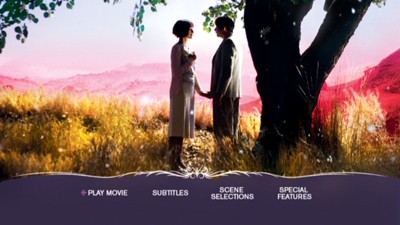 | 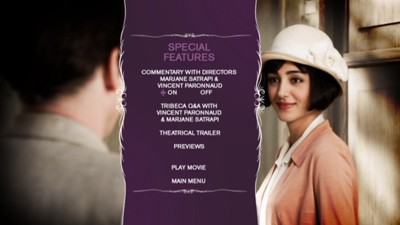 |
Video and Audio:
It's a shame that Chicken With Plums didn't receive a Blu-ray release, because Vincent Paronnaud and Marjane Satrapi's a gorgeously-shot film is full of fun, inviting imagery, sumptuous lighting, and a few bursts of captivating graphical artistry. As with their previous DVD-only releases, Sony have ensured that the absence of a high-definition release isn't felt too intensely: this 2.35:1-framed, 16x9-enhanced transfer grasps the richness of the photography with a keen, nuanced eye. The subtle details in clothing, flutters of smoke, clock gears and Nasser-Ali's wood-grain violin(s) skillfully represent the textural flourishes of their artistic aims, while the depth of skin tones and the overall grasp on contrast furthers that grasp on mood. Aside from slight flatness and harshness due to the format's limitations, and an occasionally intense moment of moiring in some complex textures, it's a fine treatment.
The 5-channel Dolby Digital audio treatment covers roughly the same basis, a clear and mostly successful embodiment of musical touches and rustic environment representation. This isn't an aggressive audio experience, though, instead largely dialogue-driven and front-heavy with the aural pleasures it offers: the strum of a bow across a violin, the shattering of glass, and the chiming of a cuckoo clock. Instead, outside of a few robust crescendos in the music, the burden falls on the French language dialogue to sustain the audience's attention, which it mostly achieves; Almaric's crystal-clear voice hits a fine balance between high- and lower-end elements, while the voice of Azrael touches a bit on the bass quadrant -- but not aggressively so. A few moments of elevated voices create a raspy quality that showcases the track's limitations, and some of the balance only creates suitable ambience, but it'll do nicely. Subtitles are presented in bright, articulate English text.
Special Features:
An Audio Commentary with Marjane Satrapi and Vincent Paronnaud sheds some light on the decisions made for the film's casting and artistic directions, from the reason they chose (and contacted) Mathieu Almaric to how they seamlessly incorporated animation into the film through a pop-up book -- and, humorously, the connection between plums and Sophia Loren in Iran. Satrapi takes the wheel as the English-speaking portion of the track, while Vincent Paronnaud voices his parallel observations in French (not subtitled, unfortunately, even though Satrapi's are). Their insights are carried over into the Tribeca Q&A (15:07, 16x9), which, surprisingly, doesn't just simply retread the same content found in the commentary: they discuss character origins, more in-depth reasoning behind their decision against full-blown animation, and who assumes what directorial duties.
Sony have also included a fine, accurate Theatrical Trailer (1:54, 16x9) to round out these features.
Final Thoughts:
There's little not to like about Chicken With Plums, the follow-up to Persepolis from Marjane Satrapi and Vincent Paronnaud. Gorgeous, lyrical live-action imagery conducts a delightful yet melancholy exploration of losing inspiration and empty relationships, a fantasy centered on a man who resigns himself to death after the heart and soul of his musical ability, his violin, is destroyed. Bursts of surreal images and fanciful recollections to the past emphasize its more vibrant intentions, while strong performances from Mathieu Almaric and Maria de Medeiros give it an emotional edge. The content itself ends up being fascinating to behold but emotionally distanced, due to the story's nature, such as one can expect from a man whose ambition and longing for past experiences negate those joys he can have in the present. That's part of this visual limerick's ambition, though, which comes very strongly Recommended in this DVD package from Sony Pictures Classics.
|
| Popular Reviews |
| Sponsored Links |
|
|
| Sponsored Links |
|
|
| Release List | Reviews | Shop | Newsletter | Forum | DVD Giveaways | Blu-Ray | Advertise |
|
Copyright 2024 DVDTalk.com All Rights Reserved. Legal Info, Privacy Policy, Terms of Use,
Manage Preferences,
Your Privacy Choices | |||||||









